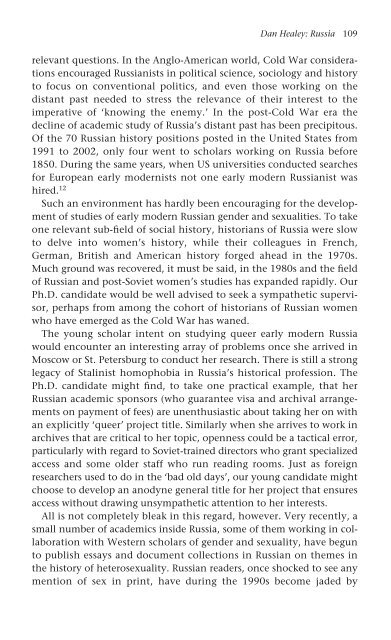queer masculinities
queer masculinities
queer masculinities
Create successful ePaper yourself
Turn your PDF publications into a flip-book with our unique Google optimized e-Paper software.
Dan Healey: Russia 109<br />
relevant questions. In the Anglo-American world, Cold War considerations<br />
encouraged Russianists in political science, sociology and history<br />
to focus on conventional politics, and even those working on the<br />
distant past needed to stress the relevance of their interest to the<br />
imperative of ‘knowing the enemy.’ In the post-Cold War era the<br />
decline of academic study of Russia’s distant past has been precipitous.<br />
Of the 70 Russian history positions posted in the United States from<br />
1991 to 2002, only four went to scholars working on Russia before<br />
1850. During the same years, when US universities conducted searches<br />
for European early modernists not one early modern Russianist was<br />
hired. 12<br />
Such an environment has hardly been encouraging for the development<br />
of studies of early modern Russian gender and sexualities. To take<br />
one relevant sub-field of social history, historians of Russia were slow<br />
to delve into women’s history, while their colleagues in French,<br />
German, British and American history forged ahead in the 1970s.<br />
Much ground was recovered, it must be said, in the 1980s and the field<br />
of Russian and post-Soviet women’s studies has expanded rapidly. Our<br />
Ph.D. candidate would be well advised to seek a sympathetic supervisor,<br />
perhaps from among the cohort of historians of Russian women<br />
who have emerged as the Cold War has waned.<br />
The young scholar intent on studying <strong>queer</strong> early modern Russia<br />
would encounter an interesting array of problems once she arrived in<br />
Moscow or St. Petersburg to conduct her research. There is still a strong<br />
legacy of Stalinist homophobia in Russia’s historical profession. The<br />
Ph.D. candidate might find, to take one practical example, that her<br />
Russian academic sponsors (who guarantee visa and archival arrangements<br />
on payment of fees) are unenthusiastic about taking her on with<br />
an explicitly ‘<strong>queer</strong>’ project title. Similarly when she arrives to work in<br />
archives that are critical to her topic, openness could be a tactical error,<br />
particularly with regard to Soviet-trained directors who grant specialized<br />
access and some older staff who run reading rooms. Just as foreign<br />
researchers used to do in the ‘bad old days’, our young candidate might<br />
choose to develop an anodyne general title for her project that ensures<br />
access without drawing unsympathetic attention to her interests.<br />
All is not completely bleak in this regard, however. Very recently, a<br />
small number of academics inside Russia, some of them working in collaboration<br />
with Western scholars of gender and sexuality, have begun<br />
to publish essays and document collections in Russian on themes in<br />
the history of heterosexuality. Russian readers, once shocked to see any<br />
mention of sex in print, have during the 1990s become jaded by


